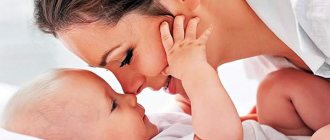All parents eagerly wait for their baby to say his first word, and then a whole sentence. Of course, everyone begins to worry when a child of 1 year does not speak a word, but the neighbor’s child is already in full swing on the street, albeit not entirely clearly, with his parents. What do experts think about this? Should all children start talking at the same age? What words does a 1 year old child say? We will consider all this in further content, and also get acquainted with the reasons why the baby refuses to speak, and learn how to quickly teach a child to talk.
Norms of speech development
Is it normal when a child does not speak at 1 year and 2 months, but friends have a one-year-old child who already knows a lot of words? First of all, you need to understand that not all babies develop the same way. Some begin to walk faster, others begin to talk, all children are individual. But there are still standards for speech development, and if there are serious deviations, then you should start sounding the alarm and contact specialists (neurologist, psychotherapist, otolaryngologist, speech therapist). How many words does a 1 year old child speak? Now we’ll find out, but let’s look at the speech norms from the first months of life; deviations can also be noticed from them.
- At the age of 1-2 months, a child should learn to express his emotions by screaming - a different intonation that makes it clear whether the baby is happy or not.
- The speech center must be rebuilt to babble from screaming within three months. At approximately 2.5-3 months, the baby begins to “walk” and “coo.”
- From five months to six months, the syllables “ma”, “ba”, “pa”, “bu” and so on should appear in speech; they can be repeated, and many people think that the baby is already consciously calling his parents and grandmother. This is not true, these are just repeated syllables that need to be taught (say “ma-ma”, “ba-ba”, “pa-pa” more often). At this age, intonations appear.
- From seven to ten months, active babbling begins, repeats many sounds after the parents, speaks in repeated letters and syllables “ma-ma-ma-ma, ba-ba-ba-ba-ba, pa-pa-pa-pa, ma-ka.” , ba-ka a-a-a” and so on.
- At 11 months there should be a minimum vocabulary: dad, baba, mom, give, aw, na.
- How many words does a 1 year old child speak? There are various data from different specialists, and the range is from 2 to 20. Here are simple words and sounds: mom, baba, aunt, dad, give, na, meow, woof, let's go and so on.
When is a child ready to speak?
For the first year, mother and child are in symbiosis. The baby cannot speak; his only language is crying. The mother develops an amazing ability to understand his “language” and translate it into universal human language: now the baby wants to drink, then he wants to eat, and in the evening he wants to sleep. Mom can satisfy his needs. Thanks to this, the child survives the first year.
Gradually, the baby stops latching, begins to crawl, and takes his first steps. This is a very significant event for him. Now he feels separate from his mother. He can move closer or further from her as much as he wants, he can run, he can reach the treasured shelf with a bright toy. It is at this age that the first words appear. As soon as the child begins to feel separate from the mother, the need to talk appears.
On the other hand, by the end of the first year, the mother gradually comes out of fusion with the child and loses her superpower to read minds. Now the child, in order to express himself and his needs, needs to learn to speak his mother’s language.
Don't confuse babble with words
Some parents boast that a child under one year old is already such a talker, he just won’t stop talking. But more often, parents confuse babbling with words. Babbling is just a collection of sounds that a child is just learning to pronounce, babbling out of boredom.
Others begin to worry that the child is 1 year 1 month old, does not speak a word, only babbles. And here you can be wrong. Words, even if they look like babble (ka-ka, boo-ka, up-up, and so on), have a certain meaning, and one “word” can mean many things. For example, “ka-ka” - it can be either something unpleasant, garbage, or a swing (can’t say kach-kach, but calls), or even an imitation of a crow - “kar-kar” (there is no “r” sound yet "). So, one “word”, similar to babble, can have a whole bunch of meanings, which means that it is not one, but several words.
Causes
There are two main reasons why a child does not want to speak at 2.5 years old. Both of them are not associated with illnesses, traumas and developmental delays, which is why they can be solved without problems:
- “Silence” in communication with a child. Speech therapists, psychologists and experienced teachers recommend talking to a newborn from its first days. The child must hear speech from the very beginning in order to have an interest in it, and so that later it will be easier for him to teach him to speak.
- If the speech of the adults around the child is fluent, fast, and unclear, then the children are not able to repeat all this. This creates a problem that can be solved simply by slowing down the pace of speech. And not only in communication with the baby, but also always when he is in close proximity.
Common physiological causes are:
- hearing problems;
- motor apraxia of the facial or tongue muscles;
- unfavorable conditions during intrauterine development, difficult childbirth;
- severe colds and viral diseases in the first 2 years of life;
- traumatic brain injuries, including minor ones;
- stress from moving, changes in family composition;
- bilingual family or environment;
- increased intracranial pressure;
- birth injury;
- no need for speech.
Reasons include physiological factors (genetic predisposition, underdevelopment of the speech apparatus), psychological (lack of attention, fear), neurological diseases (motor alalia - the child does not speak at all or speaks poorly, confusing endings, sensory alalia - speech underdevelopment, characterized by impaired speech understanding , dysarthria - erratic breathing rhythm, nasal voice, unclear pronunciation of sounds, aphasia - the child’s speech is distorted, the pronunciation and meaning of phrases are impaired).
Should you worry if your baby doesn’t speak at one year of age?
Having heard from parents that a child of 1 year 1 month does not speak, or has few words in his reserve, the pediatrician begins to pay increased attention to this aspect, which worries moms and dads. But it is worth noting that not a single experienced pediatrician, speech therapist, or speech pathologist will talk about developmental delay, considering only speech delay. It is worth paying attention to other indicators.
So, if the baby is keenly interested in everything around him, his fine motor skills are developing well (in particular, tweezer grip), there are no problems with vision, hearing, and there were no complications during childbirth or pregnancy, then you should not worry too much about the lack of speech. In any case, you need to be examined by a neurologist, and the pediatrician, based on the identified indicators, will evaluate the baby’s development comprehensively.
All parents should remember that the baby will not start talking on his own; you need to work hard with him. Today, due to the proliferation of gadgets that children are occupied with instead of learning to speak, the problem of speech development is more relevant than ever. Moms and dads should understand that it is better to prevent this problem, to prevent it, than to deal with the consequences later, because a severe delay in speech development affects full development.
If a 1-year-old child does not want to speak, then you should pay attention to the following indicators:
- Reaction to your name, other people, change of environment. If the baby does not follow objects, does not turn his head in the direction of the noise (or his name), then he needs to undergo a comprehensive examination.
- Imitation of sounds, movements.
- The presence of babble, similar to words, communication with surrounding movements and sounds.
If a child has hearing or vision problems, or childhood autism, then learning to speak should be done with the help of specialists. Of course, you also need to study at home; specialized books will help with this. If the child does not belong to these categories, then there may be other reasons for the lack of speech, and we propose to consider them.
Why do children speak poorly?
There may be several reasons. Conventionally, they can be divided into organic and social.
Organic
Among these, lesions of the brain and hearing organs predominate. Less commonly, developmental disorders of the speech apparatus.
- Encephalopathy
A characteristic pathological process for children under 3-5 years of age. Accompanied by general disorders of higher nervous activity. Intelligence and memory decrease. In addition to speech dysfunction, behavioral problems or hyperactivity and attention deficit disorder (ADHD) are observed. Or lethargy, drowsiness, weakness. Both options are dangerous. Without special treatment, it is impossible to achieve functional restoration. They will continue to fade, development will slow down significantly. It is necessary to contact a neurologist.
- Birth injuries
Head injuries (TBI) and other options. Also asphyxia, for example, when the neck is compressed by the umbilical cord. Variations are possible. Birth injuries cause persistent disturbances in the functioning of cerebral structures. At best, only speech will be impaired. More severe problems, including secondary dementia, are also possible. Although there will be no organic underdevelopment in the clinic.
- Prematurity
Babies born prematurely are at greater risk. Because the brain continues to develop and form, without the help of the mother's body. Without excess nutrients and oxygen. The body has to produce everything on its own. Consequently, the resource that children born at the right time have is spent. Such children become sickly, they are weaker than their peers and often begin to speak later. You can cope with this situation, especially if you adhere to a normal regime, create the right diet and regularly exercise your brain. According to the age.
- Intrauterine hypoxia
Happens more often than you might think. If the baby inside the womb does not receive enough oxygen, the brain suffers. The process is possible both during pregnancy and in the last trimester. Right before labor is resolved. Both options are equally dangerous. In the first case, the fetus is guaranteed to get problems. At the very least, it will be bad to speak. Disorders such as encephalopathy and hypothalamic syndrome are also possible. In the second case, death from hypoxia is possible. Childbirth in cases of acute oxygen deficiency is resolved by cesarean section.
- TBI
Acquired, for example, in the early years: concussion, hematoma and other forms. Accompanied by severe damage to cerebral structures.
- Autism
Mental illness. Severe forms of autism are characterized by a complete absence of speech. The child speaks poorly or does not speak at all. 3 years - no question. The child is 7 years old - the function still does not develop. In milder forms, individual phrases are possible, but only in certain situations when biological needs are affected. High-functioning autistic people, such as those with Asperger's syndrome, do not suffer from such disabilities. However, they have problems understanding emotions and expressing them. Therefore, speech may be poor in modulation and intonation, which is quite normal for such patients.
- Down syndrome, separately there is oligophrenia in varying degrees
Recovery is impossible, but some measures are being taken to adapt. People with mild mental retardation develop most easily in this group. There is sufficient vocabulary and opportunities to use it.
- Hearing loss
A condition in which the patient hears in only one ear. In this case, the child speaks very poorly, although the intellectual component is normal. The reason is that the young patient simply does not hear correctly what others are saying. The more pronounced the disorder, the worse the speech. You need to work with a speech pathologist and audiologist.
- Inflammatory diseases of the brain
Meningitis or encephalitis. It is quite difficult to meet the second one in a city. Rural residents risk several times more, since natural areas are infested with ticks. Possible tick-borne encephalitis. Meningitis can become a complication of inflammatory and infectious diseases. In any case, urgent treatment is needed with antibiotics and anti-inflammatory drugs. Under the supervision of infectious disease specialists and neurologists.
- Congenital anomalies of the speech apparatus
For example, a short frenulum of the tongue. Require surgical treatment. At least if the child cannot adapt to the deviation.
Social
Reasons that are due to parental influence and environmental influence.
- Overprotection
If in this case the question arises, why does a 4-year-old child speak poorly, the answer is because there is no need for it. Plus, there is no normal example. Therefore, a young patient needs to be looked after moderately, speak correctly, and not babysit. Because when he hears incorrect examples, he adopts them.
- Insufficient guardianship
Back side. Again, there is no normal speech example, there is not enough verbal practice.
- Lack of social connections
It is found in the so-called Mowgli children. Speech is a socially determined mechanism and method of communication. Without other people it does not develop. Formation of skills after 7 years is very difficult. Pedagogical neglect also occurs in urban environments. Suffice it to recall high-profile cases when parents locked their children in basements for years.
Doctors are studying all the reasons. Based on the provoking factor, treatment is selected.
Genetics
If a 1-year-old child does not say anything, but he does not have any deviations and all other development proceeds with a bang, then you need to ask your grandparents how old you were when you said your first words. If one of the parents was silent in childhood and began to talk only at 2-3 years old, then there is a high probability that his child will begin to communicate later than the prescribed norms.
If the matter is genetics, this does not mean that you can calmly wait for the first words, you need to continue studying. Watch together popular video lessons “Learning to Speak” for children from 1 to 3 years old. This is an accessible technique and can be viewed for free on the Internet. Read books, ask your child to name fairy tale characters from pictures (cat, dog, uncle, and so on), and let the child learn basic words for now.
When should you worry?
Many argue that the only reason for concern is when a child does not speak at all by the age of 3, and in other cases you should just wait, since the scope of individual development can be quite wide.
Why a child does not speak at 3 years old - the next article will tell you about this.
At 1.5 years old, you should worry if by this time the child has never heard babble, or he does not imitate the speech of adults at all; neither your words nor entertaining and educational games can arouse his interest in communication.
Gender
It is generally accepted that girls begin to speak a little earlier than boys, and this is true. Therefore, if your neighbor’s one-year-old Alenka already knows a few words, and your 1-year-1-month-old child doesn’t speak as clearly, then don’t worry. There is a difference in the development of speech, but later on boys begin to put together sentences faster, since they develop the ability to understand actions and movements earlier (let’s go for a walk, give me a drink). For girls, in this regard, everything is different, they understand objects more, and “let’s go for a walk” can sound like “swing”, “slide”, and “let me drink” - “juice” and so on.
Individual characteristics, gender and heredity
Sometimes long silence is due to the individual characteristics of the child. Undoubtedly, each baby is unique and develops according to its own specific pace and schedule (along with existing average norms). Some children begin to walk very early, but talk later; for others, everything happens just the opposite. For example, a child does not speak until he is two years old, and then within six months he catches up in this regard with his peers who started “talking” when he was one year old.
Such a delay in speech development is called tempo. The baby himself is healthy, has no deviations, but is entering the right “track” of development with some delay. However, experts still attribute only a slight lag from the norm to individuality.
A child may be completely healthy, move actively, but due to individual characteristics begin to speak with some delay
One girl came to the nursery group with my son at the same time. She did not say a single word and generally behaved rather strangely (she did not make contact with the teachers, even showed aggression, completely ignored other children, routine moments, etc.). Time passed, but she remained at the same level of development. Her mother assured that the eldest child at the same age behaved similarly, and then everything worked out, and he went to school perfectly. Meanwhile, teachers, a medical worker and a preschool methodologist urged the woman to see a doctor, but she stubbornly refused. She apparently did it in the end. The child stopped attending kindergarten and does not go to school today (obviously, some serious neurological disorder was identified).
Children can also be silent due to hereditary factors. If one of the parents started talking late, then it is very likely that his child will behave the same way.
If one of the parents was silent, then it is very likely that the child will behave the same way
Interestingly, speech delay is mainly characteristic of boys. This has scientific basis. In future men, the bundle of nerve fibers connecting the hemispheres of the brain is thinner and develops more slowly than in girls (despite the fact that each hemisphere is well developed). Because of this, the exchange of information between the hemispheres is difficult: it is difficult to put your thoughts into verbal form. Therefore, boys in general begin to speak later than girls - on average by four months. The culprit is the hormone testosterone, especially if its levels exceed the average. Subsequently, the development of both sexes levels out.
Interestingly, there are approximately twice as many boys who stutter as girls. And for those suffering from dysarthria (the child speaks incomprehensibly and pronounces many sounds incorrectly) – threefold.
Interestingly, girls have problems with speech development much less frequently than boys.
Cognitive abilities
Curious and active children begin to talk earlier than quiet ones, who prefer not to crawl around in all the inaccessible places in the house, but to calmly play in the crib with their favorite teddy bear. And recommendations for teaching speech in this case will also differ.
If the baby is active, then be close to him everywhere, show and name objects and movements. When the baby is not so active, then buy books with voice accompaniment, show characters and objects in the pictures, name them, and then ask the baby to name them. For example, to the question “Who left grandma,” the child should say “Kolobok” (if it’s unclear, but we’re talking about Kolobok, that’s fine too).
How to stimulate speech at 1.5 years old?
Various games and exercises will help develop the speech of a one and a half year old child:
- "Telephone". Into a non-working or toy phone, say words that your baby already knows, then ask him to repeat them. Focus on pronouncing words as clearly as possible with emphasis on stressed syllables. In the future, you can add words to the game that the child could hear, but cannot pronounce himself.
- "Construction". The game is more suitable for boys. Load and unload the toy dump truck with blocks or other objects, making sure your child gives the commands “up,” “down,” and “stop.”
- Communication with a doll. A more convenient game for girls. Configure the child so that he thinks that the doll dreams of hearing the baby's voice.
- "Dunno." A game for children who don't speak because they are lazy or have no reason to. One of the parents takes a toy and walks around the house with it, pronouncing on its behalf everything that comes along the way, all the time confusing the names. This must be done in front of the child. To make the game more interesting, you can set an additional condition according to which all toys that are incorrectly named by an adult and not marked by the child as incorrect names will be sent to a black bag (or any other place inaccessible to the child). Thus, the child has an incentive to return those same “lost” toys by correctly pronouncing their name.
- Games with pictures. The child needs to name the objects and animals he sees in the pictures. To increase your child's interest, you can offer him a small reward (a treat or a toy that the child likes) at the end of the game. For example, for each correctly named object, a child receives 1 cube, and he needs to collect 10 cubes (more is possible). It is better not to show the gift itself to the baby, but to hide it nearby under a scarf or towel. To complicate the task, you can ask the child to name individual parts of animals and objects shown in the pictures.
- Stimulation of fine motor skills of the hands. Plays an important role in speech development. You can conduct finger massage sessions or invite the child to sort out stones, cereals, fasten and unbutton buttons on clothes, and tie shoelaces. Other ways to develop fine motor skills can be found here.
Be extremely careful not to leave your child alone with small objects so that they do not put them in their mouth and try to inhale them.
- "Theater". Stage scenes with toys, distribute roles with your child and each speak for their characters. Don't forget to keep an eye on your child so that he doesn't lose interest.
- "Keep following me." Before starting this game, the child must be familiarized with the children's poems you have chosen. After you have read them to your baby several times, so that the child can remember the text, repeat the verse again, but at the end of the lines, become silent so that the baby can finish them himself.
More exercises and useful tips to help your child start speaking are collected in this article.
You can find many more games and exercises for speech development, but do not forget that the main thing is to do them together with your child. It is the voices of his parents, and not television, telephone and other means, that stimulate him to speak. If you are worried that your child has problems with speech development, do not be afraid to contact pediatricians or speech therapists.
Baby's interaction with adults
Not all parents can fully engage with their baby due to their busy schedules, and tablets, phones and other gadgets come to their aid in this. Like, hold it, son, press the buttons or the screen, this is interesting. And then they are surprised that a 1-year-old child does not say “mom”, “dad” and other basic words. You need to work with children on your own, because a computer cannot replace communication with a person. Even educational games where the gadget asks you to show a dog and a cow are not a conversation. The child will simply silently press on the images that have been requested, but will not name them. After such upbringing, it is very difficult to teach a child speech; he is simply not interested in it.
Put away the gadgets, start taking care of your child yourself, because nothing can replace live communication, mother, father. Read books, watch cartoons, video lessons that teach children to speak, repeat the words of the characters together. They really help to start speaking new objects and things. Go to the zoo, show live animals, this will evoke a number of emotions, and the child will try to name the elephant, tiger and other inhabitants of the park.
What to do if your child speaks poorly
Treatment required. The intensity and nature of therapy depend on the specific clinical case and the cause of the disorder. Here are some options:
- removal of adenoids, if a person cannot speak due to their growth;
- complex therapy of sore throat, inflammatory lesions of the pharynx;
- plastic surgery of the speech organs, for example, the frenulum of the tongue;
- correction of hearing loss, as an option - with the help of a hearing aid or internal cochlear apparatus;
- prescribing nootropic drugs and drugs for correcting cerebral blood flow and metabolism in cerebral structures;
- specific therapy for mental disorders, communication with the child, work with a speech therapist - the child should speak as much as possible, it is important to create the right verbal environment for him (adults should pronounce words correctly and interact with the patient as much as possible, placing all responsibility on the doctor is not a good idea, the effect will be much less).
As needed, exercises for the speech apparatus and physiotherapy are prescribed.
Motivation
Motivation is the real driver. If it is not there, then nothing will work. Think for yourself, would you speak if everything was brought to you according to the direction of your hand? So do children. If a child at 1 year 1 month does not say “give”, but points to the juice with his finger, then there is no need to immediately run and carry it. It is important to motivate your child, he is much smarter than you think, he is just lazy. For example, the child points to the juice, start asking “What?”, “What is this?”, “Why juice?” Grandma comes, and the baby smiles and points his finger at her? He's waiting for you to say who it is. And you ask: “Who came to us?” “Who brought the gifts?” Remind her that this is a “woman”, and again ask who she is.
The same should be true with the provision of toys, books, going for a walk, and so on. Don’t do everything at the wave of the child’s finger, pretend that you don’t understand what he wants. The baby needs motivation to name things and actions with words.
Classes not suitable for age
How to teach a child to speak at 1 year old? It is necessary to show pictures, naming objects in them, naming things, actions, but not overload the baby’s brain with symbols. Many parents are sure that if they start teaching their child to count early and show letters and numbers, then he will grow into a genius. This is all true, but just the opposite. The brain of a one and a half year old baby is not ready to learn counting. He will remember letters and numbers and show them in a picture upon request, but all this in silence. At one year of age, a baby should learn to speak, not count and memorize the alphabet, and everyone needs to know this.
Classes should consist of communication, live conversation, reading, repetition of syllables and sounds: ma-ma, ba-ba, kitty, meow, and so on. Don't try to make your child a prodigy, but don't stop at learning only basic words. You need to learn to explain actions in words: let's go, give, go, take, walk, eat, and so on.
Pathological situations requiring treatment by a specialist
In some cases, delayed speech development in a child is caused by a physiological factor, a certain developmental pathology. The following main options are possible:
- Hearing impairment. Naturally, when a child cannot hear the speech of others, it is very difficult for him to speak. The anomaly can be congenital or acquired (a previous infectious disease, prolonged colds, otitis media, traumatic brain injuries, bruises, taking strong antibiotics). Hearing impairment can be suspected if the baby does not pay attention to sound signals (for example, rattles) and does not react in any way when the mother addresses him.
- Underdevelopment of articulation organs. After all, the pronunciation of sound directly depends on the functioning of the speech apparatus. The problem may arise due to decreased tone of the facial muscles, short frenulum of the tongue, anomalies in the structure of the lips, and soft palate. Parents should pay attention if the baby has difficulty chewing solid food, he often drools, and his mouth is always open.
- Brain lesions, for example, primary underdevelopment of speech centers (alalia). The root cause may be a complicated pregnancy (fetal hypoxia, gestosis, bad habits of the expectant mother, etc.), difficult childbirth (trauma, asphyxia, etc.), a fall or serious illness in infancy. The formation of speech is directly related to the mental development of the baby. Thus, the indicated problem occurs, for example, with mental retardation, autism, Down syndrome (all these diseases have their own characteristic symptoms).
In any case, if a child has problems with speech, first of all you need to make sure that the child hears well. If the reaction to sound is normal, ear disease can be excluded as the cause of the speech disorder. It is very rare, but it still happens that the cause of “speech retardation” is some kind of brain disease. Even underlying neurology can cause speech center disorder. If something similar is observed in a child, then it is necessary to treat the underlying disease - the cause of speech difficulty. You should contact a neurologist, and the sooner the better.
E. Komarovsky
https://www.komarovskiy.net/faq/v-3-goda-ne-razgovarivaet.html
Delayed speech development may be due to hearing impairment
The pacifier is the enemy of speech
If a child at 1 year 1 month does not speak, but constantly sucks a pacifier, then you should not be surprised at the lack of speech. With a pacifier, the baby withdraws into himself, it is more difficult for him to explain anything, he remembers little, as he is busy with other things. Further, if you use a pacifier after one and a half years, it will cause a damaged bite, which, in turn, affects not only the appearance, but also the speech, it will be less intelligible.
If possible, stop using a pacifier altogether after a year. If there is a need, then give it to the baby only for a while until he falls asleep, and then take it out of the mouth, this way the baby will quickly wean himself from the habit of sucking.
Two-year-old silent ones
It happens that children, having crossed the milestone of 24 months, do not begin to delight their loved ones with funny conversations. All that remains are onomatopoeia, fragments of words, or “mooing,” facial expressions and gestures. What is the reason and are these circumstances a pathology? After all, all children are completely different in their development. Still, it is not advisable to ignore existing norms.
If such a problem arises in the family, parents must identify the cause, since two years is the most sensitive period for the formation and development of a child’s cognitive abilities. Perhaps the child is developing along an individual path, and will soon catch up with his peers. But the reasons for delayed speech development may be different, and time for acceptance will be missed.
You should understand what parents mean by the concept “the child does not talk”:
- says nothing at all;
- speaks indistinctly, without making certain sounds;
- speaks less than parents would like (either in comparison of parents with themselves in childhood or with previous children in this family);
- pronounces inaudible sounds that do not resemble words;
- unable to connect words in sentences;
- does not speak, but can point to an object, understanding what it is about;
- does not speak at all, does not perceive the interlocutor, does not find communication.
In each individual case, correctional activities will be structured differently. It may be completely inappropriate, but the source of the problem must be found out. There are many factors that influence a child's speech development.
Let's consider two options.
The child does not speak, but understands everything
This is where expressive speech disorder occurs. A common problem in the modern world: “He understands everything, but doesn’t want to talk.” Comparing their child with their peers, parents involuntarily understand that something is wrong, but begin to look for a way out of the situation closer to three years. Perhaps the child has dysarthria (a problem with the articulatory apparatus), as a result of which the baby does not accumulate vocabulary. Maybe there is some kind of psychological background. It is important to note other signs:
- preservation of hearing and intelligence;
- psychophysiological development corresponds to the norm;
- there is communication through facial expressions and gestures, adequate emotional manifestation;
- There are no signs of autism spectrum disorders, the manifestations of which can be noticed from the age of 2.
Does not speak or understand spoken language
Concurrent expressive and expressive language disorder. This problem is much more complicated than the previous one. It is necessary to contact specialists and conduct a differential diagnosis with various disorders: hearing defects, intellectual impairments, emotional-volitional disorders. If no extraneous pathologies accompanying speech pathologies are identified, sensorimotor alalia occurs. Such a diagnosis can only be made by a neurologist, having appropriate grounds for this. And correctional work will be carried out under the careful supervision of a speech therapist-defectologist. The problem requires immediate correction, since over time the baby’s speech will not change; he needs speech therapy help.
Twins or triplets
If you are lucky enough to become parents of several children at once, then do not be surprised at the later development of speech. Officially, standards for speech development have not been introduced for twins, but any speech therapist, neurologist, pediatrician and defectologist will say that babies will begin to speak later than children of a singleton pregnancy. Why is this happening?
The fact is that twins do not need to communicate with anyone other than each other for a very long time, and they already understand their “hooting”. Twins and triplets communicate with each other in their own dialect, and that’s enough for them; they have no motivation to learn words. What to do?
You need to spend as much time communicating with your children as possible, and it is advisable to talk to them alone more often. For example, let dad sit in a room with one, read books, teach him to speak. Meanwhile, the mother took another child into the bath for a bath. And you also need to do something in the bathroom, there are a lot of interesting things here: “duck swims”, “kup-kup”, “wash”, “water” and so on. Then we change places with the children - at least a little time, but they will spend without each other, and the motivation to communicate with other people will appear.
Factors influencing speech formation and what to do
Exogenous (external) factors
Problems not related to the child's intellectual capabilities.
- Speech atmosphere in the family. A lack of communication can lead to a child not developing a predisposition to imitate. If parents practically do not talk to their child, citing being busy or tired, he will simply have no one to learn to speak from. Therefore, from the first days of life it is necessary to devote time to communicating with the baby.
- A special psychotype of a child. The baby gets acquainted with the world, observes it, forms a passive vocabulary and comprehends what he sees.
- Distortion of speech by adults imitating a child. Parents, without realizing it, can seriously harm the child’s correct perception of speech by distorting words and excessively using diminutive suffixes.
- Pedagogical neglect. A situation typical of dysfunctional families in which the child is not given due attention. At the same time, conflicts often occur that traumatize the child’s psyche, fights, and swearing.
- Overprotection. Excessive care of parents for their child, in which the child has no motivation for independent activities, including speech. The baby has no need to show speech activity; his loved ones understand and fulfill his wishes without a word, finish phrases, finish sentences.
- Psychological trauma. They may be associated with early separation from the mother, due to various factors.
Endogenous (internal) factors
These include the physiological characteristics of the child’s body that affect speech formation.
- Problems of intrauterine development (hypoxia during pregnancy, toxicosis, birth trauma, infectious diseases of the mother) can in one way or another affect the speech centers of the baby’s cerebral cortex and subsequently affect the development of speech.
- Impaired physical hearing. Decreased auditory perception entails underdevelopment of children's speech. It happens that a child reacts to many sounds of the surrounding world, but the frequency of human speech is inaccessible to him.
- Organic lesions of the speech areas of the cerebral cortex due to birth trauma or anomalies of the prenatal period cause a complete absence or partial underdevelopment of speech (alalia). Much more common in boys. In this case, the manifestations look different. Depending on the location of the lesion. In children, such a complication can manifest itself either in a complete refusal of verbal communication, or in a lack of understanding of what adults want from him.
- Insufficient maturation of the central nervous system, inhibiting speech development (premature babies).
- Defects of the articulatory apparatus: mobility of the tongue, hypoglossal ligament, tone of the muscles of the lips, face (specialists such as a speech therapist and a neurologist will help in this matter).
Pathologies that are more complex in structure and persistent in nature can also be the cause of delayed speech development:
- Intellectual impairment is represented by a primary defect, and speech impairment is a secondary manifestation.
- Autism spectrum disorders. With this developmental anomaly, as with all other defects, speech is not the only sign indicating this problem. Therefore, under no circumstances should you try everything on your child.
Stress
Any changes are stressful for the child. This could be a move, the arrival of a new family member, or, conversely, leaving (parents’ divorce, a friend asked to stay for a week, and so on), and all this affects the development of speech. The baby needs to adapt to the new environment, only then should he continue his education.
Avoid quarrels in front of the baby, do not scold animals in front of the child. Children are greatly offended by unfair punishment: if they dropped something, they put them in a corner, they scolded them, or the parents are simply in a bad mood, they grumble, do not pay attention, and so on.
The environment in the family should be healthy and calm, only in this way will the baby develop on time and fully.
We talked about what a child should say at 1 year old. We also figured out the reasons why speech development may be delayed. Now let's look at tips that will help you quickly teach your baby to speak.
Why doesn't the child speak?
Elena Larentseva
Why doesn't the child speak?
The causes of speech development disorders are divided into social ones (the leading role is played by the environment in which the baby develops)
and physiological
(related to health)
.
Social reasons for delayed speech development include insufficient attention to the child : he does not speak because he simply has no one to talk to. The environment is such that speech loses its value, for example, the TV is constantly on, adults communicate loudly with each other, and many extraneous sounds are heard. The child gets used to not listening to speech, begins to speak late and mostly in quotes from cartoons, often not understanding the meaning of the words. If mom or dad speak too quickly , then the baby does not have time to isolate individual words and eventually stops trying to understand the adult and convey his request to him. Quite often, children in bilingual families have difficulties with speech; the baby simply does not know which language to focus on; he masters both at once, but over a longer period of time. And overprotective, over-attentive parents, guessing all the baby’s wishes, do not create in him the need to express his requests and emotions in words, depriving the baby of motivation to master speech. Excessive demands and a didactic style produce a similar result. If family members force the baby to pronounce the same words and phrases correctly, then the baby stops saying anything at all.
Physiological causes of delayed speech development include:
1. Hearing impairment.
2. Underdevelopment of articulation organs - lips, tongue, facial muscles, soft palate.
3. Visual impairment.
4. Stress – fear, parental quarrels, screaming.
5. Brain damage caused by intrauterine and birth injuries, falls, or severe illness at an early age.
A physiological delay in speech development should be suspected if at 4 months the baby still does not pay attention to sound signals, does not hum, does not smile in response to the mother’s request, does not show an animation complex (vigorous movements of the arms and legs, and at 9 months does not show interest to toys with sound signals, and his only vocal reaction is loud crying.
Why is timely speech development so important?
If measures are not taken, then as the baby grows, the set of deviations in speech development will increase:
At 1.5–2 years old, the baby will not be able to say his name, name surrounding objects, perform a simple command, for example, wave his hand, approach his mother, or show a cat in the picture.
At 2.5 years old he will not be able to make a sentence of two words ( “Mom, give me”
,
"let's go for a walk"
).
The baby’s behavior will change; when communicating, he will try to use non-verbal means of communication (facial expressions, gestures)
.
At 3 years of age, the delay in speech development in a child will become especially noticeable from the outside. Even when parents do not pay attention to the problem, doctors and friends will not miss it. The baby will speak his own language , incomprehensible even to his mother, too quickly, swallowing parts of the word or, conversely, at a slow pace. He will have difficulty chewing food (the baby may choke on even a small piece, as well as increased salivation. Such a child has a constantly open mouth for no obvious reason (runny nose)
.
Delayed speech development: when to see a doctor?
The sooner treatment for delayed speech development begins, the greater the chance that the child will be able to study normally at school. To get to the bottom of the true cause of the problem, brain studies may be needed (rheoencephalography, ultrasonography, computed tomography, magnetic resonance imaging, which will help determine the attending physician - neurologist, otolaryngologist, ophthalmologist, etc. A defectologist is connected to 2-year-old children. From 3-year-olds age, if necessary, a neuropsychiatrist or an orthodontist joins in, and from the age of 4–5, a speech therapist also joins in. Drug, physical, and animal therapy are not excluded.
The first method involves prescribing drugs that actively nourish brain neurons, as well as drugs that stimulate the speech zones of the cortex. Physiotherapy - massage, magnetic therapy, electroreflexotherapy - affects areas of the brain to improve blood supply to areas responsible for diction and memory.
(from the English “animal”) is considered a promising direction for correcting speech skills.
: our smaller brothers - horses, dolphins, dogs - are involved in treatment. Particular attention should be paid to the development of fine motor skills, finger and outdoor games, drawing, modeling, appliqué, special speech games, the development of visual and auditory attention, increasing the volume of passive vocabulary, as well as creating conditions for active communication between the toddler and his peers. Usually, when the causes of the failure are eliminated and treatment is properly organized, by the senior preschool age, children with delayed speech development catch up with their peers. The effectiveness of the correction largely depends on the efforts of the parents.
Speech therapist advice:
a child’s speech to develop correctly, parents need:
from 0 to 3 months, talk affectionately to the child , sing to him, while standing, bending, walk around the crib so that the baby can follow the localization of sounds;
from 3 to 6 months, talk to the child , causing response sounds (babble)
and maintaining a joyful state, smiling, laughing;
from 6 to 12 months, stimulate babbling by entering into dialogue when the baby babbles, repeating the simple words “mom”
,
“give”
,
“kitty”
, teach to perform movements and actions according to the word of an adult:
“okay”
,
“give me a pen”
,
“goodbye”
,
“give me a toy”
;
from 12 to 24 months, learn the names of dishes (porridge, cutlet, dishes, furniture, clothing, animals, birds, body parts; develop an understanding of connections and relationships between objects ( “a bird pecks a grain”
); teach how to follow instructions of 2-3 actions:
“go there”
,
“take this”
,
“bring it to me”
);
from 24 to 36 months, show the baby more complex objects, actions, pictures, accompanying the introduction with verbal explanations; to teach to understand oral speech without accompanying visual images, to listen to short stories and poems; learn to speak in sentences , pronounce words and their endings correctly; provoke statements, teach to convey impressions, name the properties of objects.
Stages of speech development in children from 0 to 5 years:
2 months
Rejoicing, the baby makes short and similar sounds that have no meaning, but indicate good health.
3 months
Experiments with vowel sounds begin - stretching “a-a-a”
,
“uh-uh”
,
“oh-oh-oh”
;
The baby is humming and cooing
.
4 months
Rulades of vowel sounds sound: “u-u-a-a-o”
.
5 months
Vowels are joined by consonants, “words”
become longer and more varied.
6 months
Conducts a kind of dialogue with adults, at the same time listening to their speech, trying to imitate audible sounds. Understands the meaning of what he hears, and may be silent for a while to check the adult’s reaction.
7 months
From the stream of unintelligible sounds, it is already possible to identify individual syllables and even short words.
8 months
Learns to pronounce sounds, imitating adults, like an echo, does not always understand the meaning.
9 months
The first light words ( "ma-ma"
); repeats syllables with various voice modulations.
10 months
Listens to speech and imitates it, new syllables and words appear ( “na”
,
"av"
). He knows the meaning of words, looks for his mother, a toy, and points his finger at his nose.
11 months
Plays sounds at its discretion. The number of lightweight words increases slightly. A child can attach different meanings to the same words
12 months
The child already knows about 10 words and can repeat the new ones he just heard. Understands more than 20 words. For girls, this period begins earlier.
12-18 months
The words "mother"
,
“dad”
,
“baba”
,
“uncle”
,
“aunt”
,
“am-am” (is)
. Onomatopoeic words:
“av-av”
(dog,
“tick-tock”
(clock,
“mu-mu” (cow),
etc. All nouns are used in the nominative case in the singular.
18-20 months
Tries to connect two words into a phrase ( “Mom, give me!”
, uses exclusively the imperative mood of verbs (
“Go-go!”
,
“Give-give!”
).
20-22 months
Plural forms appear (the difference between one subject and several is very clear)
.
22-24 months
The dictionary reaches 300 words. Nouns make up approximately 63%, verbs 23%, other parts of speech 14%. There are no unions. Period of questions “what is this?”
.
3rd year
Grammatical forms appear - cases, tenses. First genitive, then dative, instrumental and prepositional. Multi-word phrases, subordinate clauses, connecting conjunctions and pronouns are heard.
4-5 years
Long phrases, real monologues. Period of asking “ why ?”
.
Children's acquisition of the phonetic system of their native language
Work on speech sounds should be carried out in close connection with work on the word, since sound is a significant, meaningful unit of speech (phoneme)
only in a word, for example: catfish, litter, juice, or soap, little, cute, etc. Therefore, the system of work on the formation of correct pronunciation must be built in such a way that it gives children the opportunity to gradually and consistently master the correct pronunciation of all sounds of their native language, helped to develop clear diction and master the rhythmic and melodic side of speech.
Since sounds are not pronounced in isolation, but in words, in phrasal speech, this work should simultaneously contribute to enriching and clarifying the vocabulary, developing the ability to correctly pronounce words of any syllabic structure (of two, three or more syllables with open, closed syllables, with a combination of consonants, construct sentences correctly. This system is based on the consistent practice of all sounds of the native language, both vowels and consonants.
The question arises of when to start practicing speech sounds. To answer this, you need to clearly know the patterns of speech development in children. It goes through a number of stages, having their own characteristics and proceeding favorably only under certain conditions (caring for the child’s health, his timely physical and mental development, correct speech of others).
The first year of life plays a big role in the development of a child’s speech.
At the 3rd month, the baby begins to make the first short sounds: g...k...khi...During the humming period, the child makes many sounds: a-a-a, a-gu, boo, boom, ma, am, tl, pl, pf.
When caring for a child silently, the appearance of the first sounds is delayed, and speech begins to develop later.
From 4-5 months. The child begins a period of babbling. At this time, repetition of individual sounds and syllables is noted. Soon he begins to repeat individual sounds and syllables after an adult and by the age of one year he speaks 10-20 words .
Starting from 4-5 months. speak to the child only in the correct language, without even unwittingly imitating his speech. Attentive parents and educators always know which word the child can repeat; they do not offer him difficult words, they speak slowly , clearly, connecting each new word with the object that is given to the baby.
In the period from one to two years, the child undergoes the process of initial development of speech skills. In the second year of life, a normally developing child rapidly accumulates vocabulary. By the end of the second year, the child’s vocabulary reaches 200-400 words. Some children pronounce words incorrectly, replace some sounds with others, distort words, pronounce them completely incomprehensibly, for example: “Dyat beech”
(give me a roll,
“titeti” (sweets)
A rapidly increasing vocabulary does not allow the child to clarify the pronunciation of each word, and adults must listen carefully to the child’s speech, understand it and repeat correctly those words that he distorts. Hearing the correct pronunciation of words, the child will gradually improve your speech.
During this period, it is very important to cultivate in children the need for communication, attention to the speech of others, memory for words, and the ability to produce sounds or words by imitation. This will contribute to the development of the articulatory apparatus and phonemic hearing.
The period from two to three years is characterized by active filling of the dictionary and mastering the grammatical structure of speech. Along with the expansion of the vocabulary, the assimilation of speech sounds also occurs. During this period, children love to pronounce some word, sometimes distorted, sometimes invented by themselves, just because they like the way it sounds.
K.I. Chukovsky wrote: “Rhyme creation at the age of two is an inevitable stage of our development. Those babies who do not perform such linguistic exercises are abnormal or sick. These are precisely exercises, and it is difficult to come up with a more rational system of exercises in phonetics than such repeated repetition of all possible sound variations.”
Children of this age are given didactic games to develop auditory attention, speech breathing, basic voice qualities, and induce various onomatopoeias and sounds.
By the age of three, the child already has a sufficient active vocabulary and uses detailed phrases in communication. The baby talks , loves to listen to short poems, stories, fairy tales, remembers them and retells them. But his speech is still incorrect. The child experiences difficulties in pronouncing many sounds, since the movements of the organs of articulation are still inaccurate and undifferentiated; he does not distinguish sounds that are similar in articulation or acoustic characteristics well enough. Children do not pronounce many sounds, replace or distort them. At the same time, children of this age are able to notice incorrect pronunciation among their friends. The child pays attention to his own pronunciation, gradually improves it, that is, begins to navigate the sound composition of the word.
By the age of three, there are already prerequisites for working on the material, sound side of the language. It is at this time that they begin to practice sounds, which is carried out gradually and consistently, taking into account the age and individual capabilities of the children. At this age, work is carried out by educators and parents, if there are no obvious deviations in the mental development of the child.
The skills of clearly pronouncing a sound, using it correctly in speech, and the ability to isolate sounds in a word are not developed immediately. The younger the child is, the simpler the material should be and the longer it will take to practice.
Useful tips
It is easier for a child to remember not short words, but diminutives. For example, “cat” is difficult to repeat, but “kitty” or “kisa” is easier. The same applies to the word “water”; children perceive “water” more easily.
Developing mats are good for speech development, where you press on the image and sound will appear. But the kids get used to it and just start listening. Advice: take out the batteries after a while. A child clicks on a cow (for example), but there is no sound! Then he himself will say “muu”, or maybe ask: “Where is muu?”
Which specialist should I contact?
If the child is constantly observed by a pediatrician, then problems with speech development will be diagnosed at an early stage, and the doctor himself will refer the child to specialists.
If there is no permanent pediatrician, or he does not share parental concerns, you should contact doctors of the following specializations:
- neurologist;
- otolaryngologist (ENT);
- psychologist;
- speech therapist-defectologist.
Only after consulting all these doctors can you accurately determine what is causing the delay in speech development in a child and how to deal with it.
Depending on the area in which the problem is identified, the type of treatment is determined. You should be prepared for the fact that most of these cases require drug treatment. Drugs prescribed by a neurologist or speech pathologist help activate the “speech” areas of the brain and provide the necessary nutrition to neurons.










